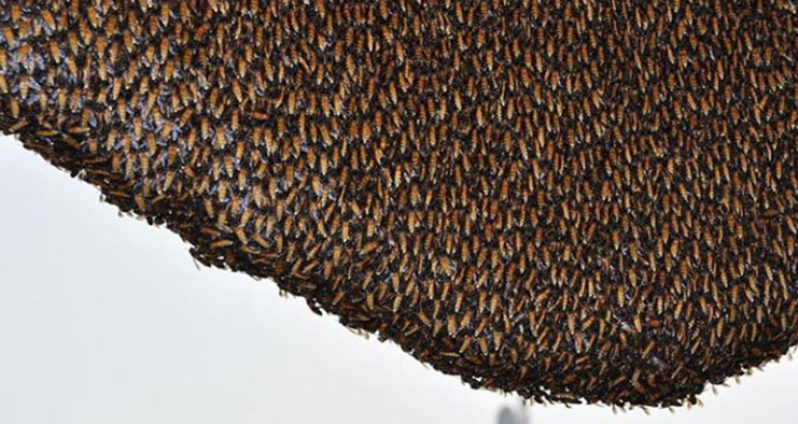A FEW dozen bees visiting your flower beds is very tropical and beneficial for your garden but hundreds of bees clustered together or seen entering and exiting a single hidden location, may be a sign that a colony has become established.
The Guyana Livestock Development Authority (GLDA) has warned persons to be wary of those colonies, especially the Africanised bees.

The Africanised bee, also known as the Africanised honey bee, and known colloquially as “killer bee”, is defined as a hybrid of the Western honey bee species (Apis mellifera), produced originally by cross-breeding of the African honey bee (A. m. scutellata), with various European honey bees such as the Italian bee A. m. ligustica and the Iberian bee A. m. iberiensis.
According to the United States Department of Agriculture, those bees were first introduced to Brazil in the 1950s in an effort to increase honey production, but in 1957, 26 swarms accidentally escaped quarantine. Since then, the species has spread throughout South America.
Although there is no local report on how many persons were affected by those bees, international reports revealed that Africanised bees are typically much more defensive than other species of bee, and react to disturbances faster than European honey bees.
They can chase a person a quarter of a mile (400 m); they have killed some 1,000 humans, with victims receiving ten times more stings than from European honey bees. They have also killed horses and other animals.
Over the years, Guyanese have also been the victims of Africanised bees.
Recently, a resident of East Coast Demerara (ECD), Ramnarine (only name given) was reportedly killed by a swarm of Africanised bees which attacked him while he was walking along the Mon Repos, ECD Road.
A video that went viral on Facebook showed Ramnarine screaming in agony as the bees stung him. Onlookers and passersby appeared helpless as they watched the man meet his demise.
The bees were reportedly disturbed by a roaming cow which walked into a clump of bushes at the side of the road.
In 2016, Rawle Singh, 30, of 3725, Tuschen, East Bank Essequibo, met a similar demise. He succumbed a week after being attacked by a swarm of African bees.
Singh was reportedly making his way to a shop in his village, when the bees attacked him, forcing him to jump into a nearby trench in an effort to escape from the insects. He was stung multiple times.
Many more cases have been reported but the GLDA is confident that they could reduce the incidence of such cases once they sensitise the public on ways to deal with or avoid Africanised bees.
The GLDA in an advertisement in the Sunday publication of the Guyana Chronicle outlined ways in which persons can avoid being stung by those bees.
Persons were urged to not swat at bees that fly around because it is most likely to provoke them and increase the chances of them stinging you.
“Keep your distance. If you locate a nest on your property, note its location but don’t approach it. Bees are much more likely to react in defense of their hive…call a professional. It is not recommended that you exterminate bees yourself,” the GLDA advised.
There are ways to be one step ahead of the bees. One way in particular is to remove potential nesting sites so as to reduce the chances of the bees forming a colony on or around your property.
According to the GLDA, most Africanised bees do not live in boxes managed by bee-keepers but rather in structures or other man-made cavities.
If by some chance you encounter a colony of bees, it is advised that you run for at least 100 yards (300ft).
“In the event of an attack, cover your head and face as these bees tend to target these areas. Use a blanket, sheet or your shirt to cover your head and face.
If you do not do have anything to cover your head and face with, use your hands to cover your face, making sure not to cover your eyes so that you can still see,” the GLDA recommended.
For more information on how to deal with Africanised bees, persons were asked to contact the Bee Unit at the GLDA on 220-6557.




.jpg)










